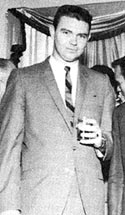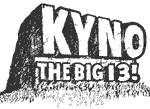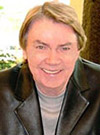|
. . . A SPECIAL REPORT FROM THE REEL TOP 40 RADIO REPOSITORY
Our thanks to Radio & Records for quotes from Bill Drake published in a 1977 interview by Bob Wilson, The Top 40 Story. Thanks also to Ben Fong-Torres for additional background from The Hits Just Keep On Coming: The History Of Top 40 Radio. In 1954 and 1955, teenager Phil Yarbrough drove around in his car at night, listening to pop hits on WCKY in Cincinnati, Ohio and R&B hits on WLAC in Nashville, Tennessee. In an interview with Bob Wilson of Radio & Records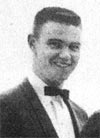 WAKE Hitparader Bill Drake in 1977, Drake said that he was always interested in radio, but got into it "more or less by accident." A friend was offered a teen-time disc jockey show on WMGR in Bainbridge, Georgia, but he didn't want to do it, so Phil Yarbrough took it. After high school, Yarbrough went to Georgia Southern College on a basketball scholarship and worked at a Statesboro radio station at night. He had planned to be a basketball coach, but he hurt his knee at the end of his freshman year. Instead of finishing college, he returned to work in Bainbridge, and then left for the all-night show at WAKE in Atlanta for $85 a week. WAKE was owned by Bartell Broadcasting. They wanted him to use a name that rhymed with the call letters. He suggested "Drake", because it was his mother's family name. He stayed at WAKE for several years, advancing to Program Director, then spent six months in the Army at Fort Jackson, South Carolina. He returned to WAKE with a promise that after one year, Bartell would send him to KYA in San Francisco. Learning to be a Program Director "I really just put it together on the basis of what I liked to listen to — without all the garbage." Where did Bill Drake learn to be a Program Director? Drake responded, "I guess I just picked it up." He said that country music was the most popular music in Southern Georgia, and he felt fortunate that a lot of hits were country. A lot of hit records in 1956 and 1957 were pop oriented and could be played any time of the day. Radio was mostly block-programmed by time-of-day then, but he convinced his manager to try a consistent music presentation in every daypart. "I really just put it together on the basis of what I liked to listen to — without all the garbage," he said.
In 1962 at KYA, Drake worked with a legendary staff that included Tom Donahue, Peter Tripp, Les Crane, and Bobby Mitchell (Bobby Tripp). The station went from sixth in the market to first most of the time, behind only KSFO in totals. When some bad business decisions forced Bartell to sell
Chenault was impressed with KYA. Drake had always wanted to program multiple stations, and Chenault offered him the opportunity to program his station in Fresno and consult another in Stockton, California (KSTN). KYNO in Fresno had always done well, but Colgreen had acquired competitor KMAK and PD Ron Jacobs, Robert W. Morgan, Steve Jay (Jay Stevens) and Frank Terry was "giving them (KYNO) a fit." Drake kept the same staff at KYNO and in ten months, KYNO had more audience than all other 13 stations in the market. And, with the same format, KSTN in Stockton was also #1.
Chenault wanted to expand and buy KGB in San Diego, but owner Willet Brown didn't want to sell. Impressed with their success in Fresno and Stockton, he hired Chenault and Drake to program KGB, and subsequently, suggested to his fellow RKO Board members that Drake should program KHJ in Los Angeles. RKO was losing millions of dollars at KHJ and San Francisco's KFRC in 1965, but Drake didn't think he would fit well into a corporate situation. RKO Chairman of the Board Tom O'Neil set up an arrangement in which Drake-Chenault reported directly to Ross Taber in New York.
"People have always thought I was crazy... Initially — which very few people remember — KHJ was called Drake's Folly..."
Drake said he had an office at KHJ, but he only used it a dozen times in the years he consulted the station. Drake consulted the RKO stations on a percentage basis - he got a percentage of an agreed amount. He also said that the format he took to Los Angeles and San Francisco was basically the same format he had introduced at KYNO. It wasn't long before Drake-Chenault also had agreements to program WOR-FM in New York, KAKC in Tulsa, WHBQ in Memphis, WRKO in Boston, and CKLW in Windsor, Ontario (Detroit). Personalities "I believe very heavily in personalities... if a guy is going to say nothing, anyhow, I'd rather he say it in as few words as possible..." Was he looking for personalities when he hired jocks? "You can't go out and hire someone and say they're going to be a personality, because some jocks can't do it," he said to Bob Wilson in 1977. "A lot of people think they can only be personalities if they talk a lot, and they don't take into consideration what they're saying. I took the attitude that there's a vast difference between personality and someone who just talks a lot. I think that when you find a jock who has something to say, then you allow him to say it. But if a guy is going to say nothing, anyhow, I'd rather he say it in as few words as possible... I believe very heavily in personalities... I mean, there are a lot of guys who are personalities and we've always tried to nurture and encourage that. We would make allowances within the format, but you can't force it. So, we allowed some people to do it, and we didn't allow others to do it." Jingles
"I just want frequency and call letters, and I want them acapella... I asked Don Otis, the old KHJ PD, if he knew anyone we could get to do some acapella jingles. "Chuck said something about acapellas might be fine for Fresno, or San Diego, but this was Los Angeles. I said well, that's what I'm going to do. I remember that Winston cigarettes, when they were allowed to have commercials on the radio, had some great 60 second jingles. But when it comes right down to it, I remember one thing out of those jingles — Winston tastes good like a cigarette should. The other 57 seconds was horseshit. Chuck said well, if you want short acapellas, I can cut them. I said no, I think that what I'll do is cut them myself... I asked Don Otis, the old KHJ PD, if he knew anyone we could get to do some acapella jingles. He said he knew Johnny Mann. I talked to Johnny and told him what we wanted, and I think the session was set for 4 or 5 days later. That was right during the transition when we were bringing Ron Jacobs in... I think that was one of Ron's first functions, coming down there with me during that session. It didn't take more than an hour or two." The Introductions "That whole thing about 'ladies and gentlemen, you're listening to this...,' was something I did when I was a kid." What about those "ladies and gentlemen" introductions? "(those came) From the mind of a nine year old child. That whole thing about 'ladies and gentlemen, you're listening to this...,' was something I did when I was a kid. My parents had bought me an old 78rpm record player, and some records. I would play those records and announce them, and I thought the "ladies and gentlemen" indicated a certain amount of class. I would simulate my own little disc jockey show just fading the record and announcing. I would say 'Ladies and gentlemen, this is YBC, the Yarbrough Broadcasting Company, Donalsonville, Georgia.' That's where the 'ladies and gentlemen' thing came from." The Commercials "...had it been a thing of costing RKO General money, at that point, it might not have happened. None of it may have happened." A major element of the "Drake Format", which was adopted by other programming consultants, was a limit on commercial content. Not only were the commercial sets tightly programmed, and the total minutes per hour controlled, but the number and placement of units in the commercial sets were programmed, too. Drake stressed that programming, not sales, should design the product. How was this possible? "Now you have to understand that KHJ was not full commercially... so the commercial policy was insignificant. No salesman or sales manager was able to alter that. However, had it been a thing of costing RKO General money, at that point, it might not have happened. None of it may have happened... Main thing is the product. If sales can go out and sell 36 units an hour, they're gonna sell them. Nobody wants to listen to that... You just have fewer commercials and you eventually charge more for them. You wind up with more revenue. RKO went along with that, but they had nothing to lose." The Overseer 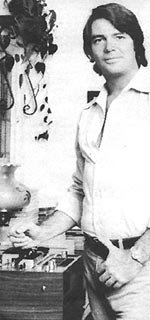 Bill Drake Drake-Chenault Drake told Bob Wilson in 1977 that "we tried to maintain things so that the station itself was like a stage or a backdrop. The format could maintain things at a certain level, it couldn't drop below that. It couldn't go into the pits, but it could be expanded upwards... There was plenty of room on top of that foundation to do things. If a jock didn't have the ability to expand that, it still couldn't fall apart. The stage, the backdrop, the station itself would maintain things at a certain level. There was enough momentum and design of the station itself to carry it under most circumstances." When asked if he was the overseer, Drake responded, "Yes, but I do it by phone from my house. I've never had a good idea in an office in my life." At one time, Drake had 21 phone lines in his house to monitor radio stations. What about those stories of calling a jock at 3 in the morning? "Well, that's not true," said Drake. "I still have those lines in my house, I listen to the stations... but I never called jocks... at 3 in the morning to talk to them, period. Even at KHJ, locally, if something was wrong, I didn't call them unless it was a case of last resort. I tried first of all to find Jacobs. If I couldn't reach Jacobs, then I would call Bill Watson... Then I might call a jock and talk to him. But some of those bizarre stories are ridiculous. I've read articles about me that I don't even recognize being me at all... not even the same person. Oh, I may have talked to a jock as a last resort, but it would be the exception. That would totally undermine the PD, the guy in charge." What about limiting the amount of time a jock can talk? Was the story about a light that glared after seven seconds true? Drake responded, "No, well, the lights wouldn't stop them, just probably throw them off whatever they were doing, and make it sound even worse... I was always accused of having robots, and yet when you look at PD's of the year, or jocks of the year, we've had as many or more than anybody else... Really good people." Drake's Best To You At the peak, Drake was doing business with over 350 stations and syndicating six formats. He sold his interest in Drake-Chenault Enterprises in 1983, and returned to the South. He bought a Florida Penthouse on the beach. He returned to L.A. seven years later saying, "I don't fish and I don't play golf." Drake told Radio & Records about calling George Beasley, the owner of KRTH (K-EARTH) and telling him that "I know what you're trying to do, I'm bored, and K-Earth ain't making it." Beasley asked him what he wanted, and Robert W. Morgan and The Real Don Steele joined Drake's K-EARTH, which featured all-new jingles from Johnny Mann. Bill Drake was married and divorced three times. He is survived by his daughter, Kristie Philbin, three grandchildren, and Carole Scott, his domestic partner. He was inducted into The Georgia Radio Hall of Fame in September, 2007.
Those who learned and enforced the mechanics of proven radio programming technique have benefitted from the simple logic of the "Drake Format," but those who can follow the rules and build on that foundation are the greatest beneficiaries of all. |

